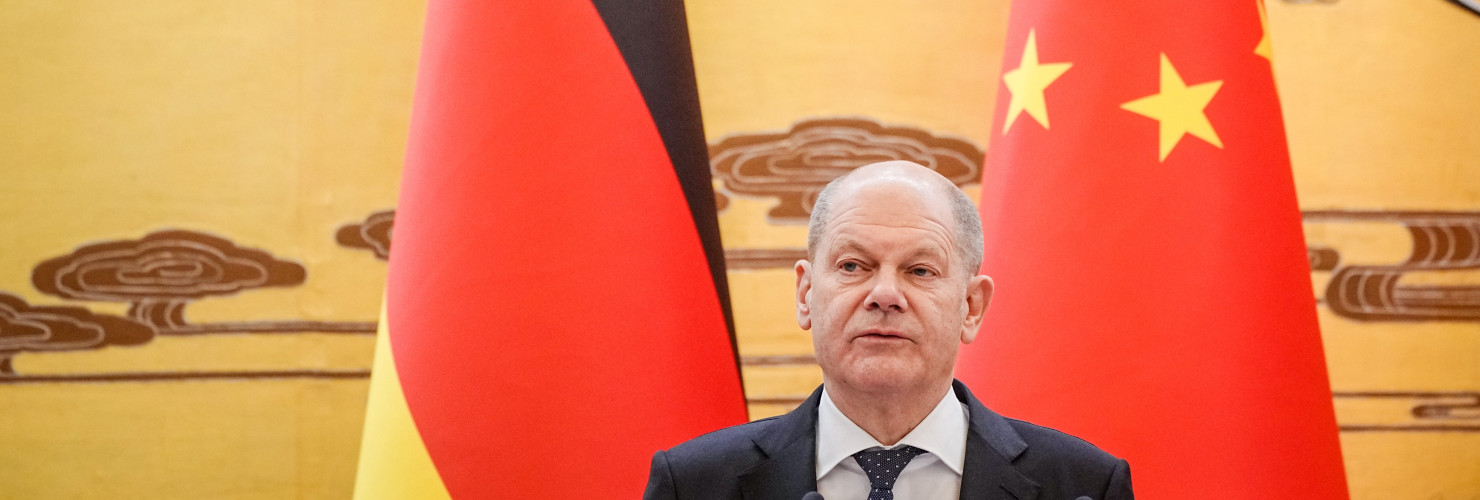

Germany needs a show of self confidence in its China policy
German policy toward China shouldn’t fall prisoner to fears of economic retaliation, writes Max J. Zenglein. A robust stance toward Beijing will not hurt business interests.
German corporate optimism about doing business in China appears undeterred by growing geopolitical risks and economic concerns. While foreign direct investment in China fell by almost a tenth in 2023, German investment hit a record of nearly EUR 12 billion. With its de-risking policy, the German government had in fact wanted to make Germany less dependent on China. This could create problems for Chancellor Olaf Scholz on his upcoming trip to China.
German business seems more susceptible to the Chinese leadership's charm offensive than companies in other countries. Amid economic challenges and tensions with the US, Beijing is trying to regain the trust of international investors. President and Communist Party leader Xi Jinping met recently with US business leaders, while Premier Li Qiang courted international companies at the annual China Development Forum. The leadership wants to underscore China’s commitment to greater openness and improved business conditions, offering better market access in the high-tech sector, less restrictive rules for cross-border data traffic, and simplified entry requirements for travelers, including for Germans.
From the perspective of some German executives de-risking policies of the German government and European Union are a greater threat than Beijing’s economic and geopolitical goals. German car bosses seem to fear that the European Commission’s probe into China’s alleged subsidies for electric cars could torpedo business relations. Even before the findings are out, the German car industry is positioning itself against any punitive tariffs because it dreads possible Chinese retaliatory measures.
German business prefers a return to the “good old days”
German business prefers the Chancellor would return to the “good old days” on his trip to China, with a focus on expanding opportunities for cooperation or improving market conditions. While the political tone toward China in the US and also in Japan has become much more critical, Germany is trying to walk a tightrope. The Chinese leadership is skillfully exploiting this, creating the impression it will reward Germany economically for restraint or even counteracting tougher EU measures.
Europe should not bat away China's outstretched hand. But limiting talks to the political support of a few companies' business with China would not do justice to the complexity of the situation. Despite Beijing's recent friendlier tone toward foreign companies, hopes of returning to economic liberalization and market-oriented reforms in China are misplaced. And German business should take seriously the challenges of China’s economic model for German and EU competitiveness. Economic policy under Xi must be seen in the context of a Marxist-Leninist paradigm with technological self-sufficiency and control of the economy by the Chinese Communist Party at its core.
China's economic model relies on investment in its industrial sector with the aim of dominating strategic areas. Whether solar cells or batteries, the list of technologically important sectors where this goal has already been achieved is growing. The rise of competitive and even leading Chinese companies in Germany's core industrial sectors, particularly in the automotive, machinery and chemical industries, is dramatically changing the market environment in China. At the same time, German companies must prepare for more Chinese competition on the global market.
Chinese companies have become more competitive and painfully show how some German companies have fallen victim to their own lack of agility. The share of German exports to China in 2023 dropped from a 2020 peak of 7.9% to 6.2% of all exports, the lowest level since 2014. Over the past 20 years, exports to China have mostly outpaced overall German export growth, but this has changed since 2021. German companies are also losing market share in China. Carmakers hardly factor in the important Chinese market for electric cars, for example, with a market share of just under five percent.
Nevertheless, German businesses remain important partners for China in terms of access to technology and capital. But Beijing increasingly expects foreign companies to contribute to China’s industrial policy goals. This means, for example, "localizing" production in China and conducting more value-added steps such as research and development there as well. Ideally, innovations should take place in China and global markets should be served with exports from China. Ironically, such localization strategies put German companies in the position of furthering China's own de-risking effort to become less dependent on Germany and other industrial countries.
China’s economic model is a serious challenge for the German economy
China’s economic model has become a serious challenge for the German economy. German companies may hope the Chancellor will use his trip to promote more market opening and investment in China, but this is no longer in Germany’s long-term interest as an industrial location. Germany’s China policy must no longer be driven by the fear that a robust stance toward Beijing will harm its own economic interests.
The Chancellor is traveling with three ministers and a business delegation. He risks the appearance of courting China’s leadership. Under no circumstances should he give Beijing the impression that Berlin can campaign against stricter EU measures like the expansion of export controls or anti-dumping investigations. Instead, he should explain to Xi that German-Chinese economic relations are no longer a guaranteed conduit for bridging political differences.
China's economic model will not change as a result, but Xi needs a clear message that staying the current course will be difficult. This would make the Chancellor neither popular in Beijing nor among the German business delegation. But it would send a clear signal and be the lesser of two evils for the German economy in the long term.
The German version of this article was published by "Der Tagesspiegel" on April 11, 2024.

